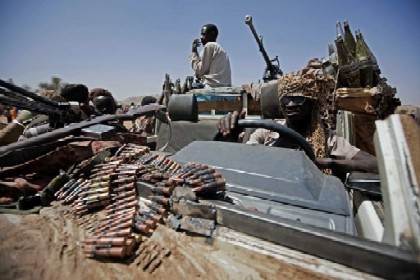Sudan Inks Peace Accord with Darfur Rebels
إقرأ هذا الخبر بالعربية
Sudan's government and a Darfur rebel group, the Liberation and Justice Movement, on Thursday signed a peace accord in Doha, as a key rebel faction rejected the deal.
Sudan's President Omar al-Bashir and leaders of Chad, Ethiopia, Burkina Faso, Eritrea and Qatar attended the signing of the Doha Document for Peace in Darfur, a fruit of talks sponsored by the African Union, United Nations and Arab League.
The Liberation and Justice Movement is an alliance of rebel splinter factions.
However, the main armed groups in Darfur -- the Justice and Equality Movement (JEM), and factions of the Sudan Liberation Army headed by Minni Minnawi and Abdelwahid Nur -- were absent and did not sign the agreement.
"This is not a peace agreement. It is just a 'jobs' agreements, offering diplomatic positions for those who sign it, and failing to solve the real problems in Darfur," JEM spokesman Gibril Adam told Agence France Presse.
Adam said the fundamental issues of human rights violations, power and wealth sharing, holding criminals to account and compensation for the conflict-displaced had not been addressed.
Minnawi himself signed a 2006 peace accord with the Khartoum government in Abuja. But it collapsed last December when he fell out with the government, which he accused of failing to implement the accord.
And Nur vowed on July 8, the eve of South Sudan's independence, to topple the Islamic regime in Khartoum and to replace it with a secular state like in the south.
"We are going to liberate north Sudan and create a liberal, secular and democratic state ... equal to south Sudan," he told AFP by telephone.
"It is our mission ... to change this Islamic fundamentalist regime. The war will not be in Darfur, it will be in Khartoum," he said, and called on "all groups in north Sudan" to join his movement and help it to achieve its goal.
Observers say opposition to the center from Sudan's neglected peripheral regions like Darfur may grow in the wake of the secession of South Sudan, which became independent on July 9.
At least 300,000 people have been killed in Darfur and 1.8 million people fled their homes since the conflict broke out in 2003 between non-Arab rebels and the Arab-dominated Khartoum regime, according to the United Nations.
The government puts the death toll at 10,000.
Bashir is wanted by the International Criminal Court for alleged genocide, crimes against humanity and war crimes in Darfur.
But the Sudanese president continues to travel around the world on visits such as the signing ceremony in the Qatari capital on Thursday, as the ICC depends on the goodwill of states to detain him.



